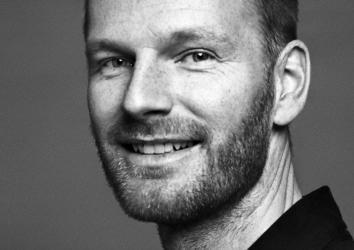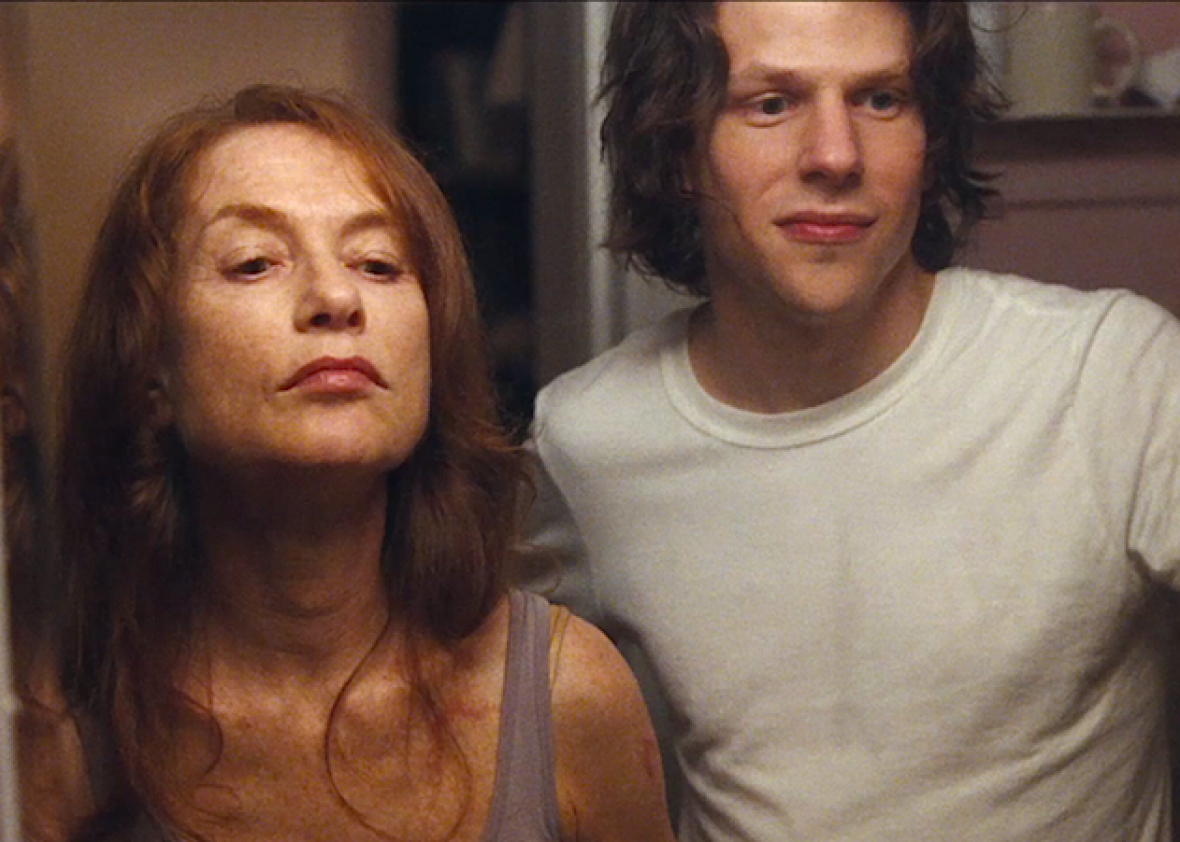When Reprise finally reached American theaters in 2008 after a long festival run, Joachim Trier earned reviews beyond most first-time filmmakers’ dreams. In the New York Times, Manohla Dargis called the story of two young men and their ambition to become novelists “a blast of unadulterated movie pleasure,” an “exuberant, exhilaratingly playful testament to being young and hungry.” His second feature, Oslo, August 31, about a troubled man wandering around the titular city for a day, was even more widely acclaimed.
Now the 41-year-old Norwegian director has come to America. Louder Than Bombs, his first English-language feature, considers a family of three men (Gabriel Byrne, Jesse Eisenberg, Devin Druid) separated by their vastly different memories of their late matriarch (Isabelle Huppert), a war photographer who came home only to die under questionable circumstances. The movie elliptically turns on their experiences, shifting from a 15-year-old gamer to his rising academic brother to their befuddled father, as they channel their wayward energy into doomed romantic ventures and increasingly destructive habits. And yet, like all of Trier’s movies, Bombs is funny, sexy, and a little mysterious, every bit the ambitious third effort we might have expected. Slate talked to Trier recently in New York about selling people on his movies, his American film influences, and what exactly is going on in Louder Than Bombs’ decidedly surreal ending. Some spoilers ahead.
Jeffrey Bloomer: I recently described your movies to someone who wasn’t familiar with them, and I made them sound grim and grave and impossible. But that’s not at all the experience of watching them.
Joachim Trier: Welcome to my life. That’s the main problem with my movies, I think. It’s impossible to pitch them. Why am I doing this to myself?
Two guys want to write novels, and one becomes crazy [Reprise’s logline]. It’s terrible! Next one, a guy is an ex-junkie and walks around town all day and kills himself [Oslo, August 31]. The worst. Now, a mother dies and people are grieving. Oh no. But I don’t feel the films are that at all. These things are events that contextualize perspectives and themes about characters. People trying to laugh, love, and live life. But I know! What’s your advice, man?
That’s what I wanted to ask you.
I’m an atheist. I think the premise that we live under is complicated. And we can be in denial, or we can feel it’s pretentious to talk about. But it’s true. Most people are terribly worried about mortality or loss or their lives not functioning. Yet people also laugh and smile at the same time. If you want to make movies about humans, you have to take on that spectrum.

Motlys
What’s a better way to describe Louder Than Bombs, then?
You could say it’s a story about three generations of men trying to figure their love lives when the mother of the family passed away three years ago. But that’s not the story either. We’re watching three people deal with the memory of someone they idealized and loved, and they’re realizing that they perceived her very differently. So who the hell was she? It’s a mystery.
The movie has a lot of shifting perspectives among the men. In another interview, you said, “It’s like an album. You have different songs. Hopefully most of them are hits.” How do you tell a single story like that?
It’s a mosaic, this one. There’s supposed to be some cracks. We shouldn’t underestimate the audience. I think of set pieces, like in an action movie—an action movie has maybe seven good set pieces. It’s like that.
You do use set pieces, of sorts, to get at the interiority of the characters. Like the scene where reads Jonah (Eisenberg) reads his younger brother’s journal, and it’s visualized with an intense, messy montage.
Yes, that’s it. Conceptual scenes, we call it. So we have a diary of a 15-year-old that gets us into his being and his thoughts. A bit like the opening of Reprise, where we see the imagination of two young men and their dreams of a pseudo-tragic, beautiful life of literature. And life happens, and it’s different and yet the same. The actual presentation becomes part of the emotional experience. Cinema has that capacity, to draw you into a lonely and intimate space with someone. In Louder Than Bombs, particularly, because it’s about family, a lot of the drama in it really comes out of the discrepancy between the various intimate places with the characters. Characters that are not really communicating, which sadly is very often the case even in close relationships.
We’ve seen that represented so much with screaming and so forth in the past with cinema, sort of cheesy sentiment. This type of movie, if it’s just presented among those 12 types of movies we’re allowed to accept, it will fall into the kind of genre that worries me—the family weepy melodrama. But I’m hoping we’re doing something else.
As we see again in this movie, you’re also particularly good at depicting mental illness.
I’m a little bit wary of the definition of “illness.”
Well, I guess—
I try to do existential portraits. Yes, in this movie, you could probably say the mother deals with post-traumatic stress. She’s come back from war too many a time. But I’m also presenting someone who has made active choices to follow her idealism and has ended up in a very lonely place, isolated from her family. It’s a situation, not a diagnosis.
But I understand what you’re saying. This is a companion piece to Oslo, August 31. In Oslo, we are in that tactile, very lonely presence of that person going through it. Whereas here, we’re dealing with the aftermath and interpretation of a similar case of, I’d say, addiction. There is an addictive aspect to going to war. Even though she starts in a very virtuous place, I’m sure, and does some great work, there’s also a sense of an addictive personality.
You see that in a lot of great movies about people who go to war and come back. The real images of warfare throughout this movie, to an American viewer, also feel inescapably political.
Yeah. It seemed like an appropriate time to make a film about a modern American family that deals with coming home from war. I come from a family where my grandfather was part of the resistance during the Second World War, and that’s had an aftereffect. All cultures go through these phases, and I think America’s at a place right now where there’s a realization that you think it’s over there, but it will ultimately affect you back here. We think we are creating borders in the world, but more and more the world doesn’t have those borders.
Conrad, the youngest son, is your first real adolescent character, and he feels like the movie’s hero and conscience.
I didn’t want to make the sort of clichéd, crazy, introverted gamer that we see in our culture. It’s a dangerous, stigmatized character. I think we need to look into that subculture with respect and curiosity. I think he is the one who undergoes the biggest change in the movie. The father and big brother change through experiences, while Conrad is rather revealed to us. He’s realizing a lot of things by dealing with love for the first time. As a storyteller, the revelation of a human being is what I dream about doing in my movies. I love the vulnerability and honesty of that age.
What about his older brother, Jonah (played by Eisenberg)? He’s kind of the villain, right? It seemed to me that if the kid Eisenberg played in The Squid and the Whale grew up, he’d become this guy.
[Laughs] I don’t know how to do antagonists! I feel for him. He’s very human and very messed up. His tragedy, his downfall, is that he idealizes. He idealizes his mother, and he tries to hold up a surface rather than accept reality. That’s never a good idea. But you’re right. There’s humor and there’s meanness in that man. I agree with you. I also think that’s what’s brave of Jesse—that’s why he was drawn to the part. Not to play the pedagogical, kind big brother. He’s a bit of a maniac and an asshole. It’s an exciting character.
Your movies are all in clear conversation with film history. Reprise was most often linked to the insurgent creative energy of the French New Wave; Oslo was compared to the social introspection of Louis Malle. Where would you say Louder Than Bombs falls?
It was very much wanting to do the character-driven drama that America has always been great at, like Ordinary People or Woody Allen or even Coppola, The Godfather. I was intrigued by the family dynamic stories done in America with great actors. That can sometimes be a gangster movie or a drama. When I was a kid, when everybody’s parents got divorced, suddenly there was Kramer vs. Kramer, that sense of present-day family dynamics done with great acting. It really meant something in its time. I could go on about Bergman and others, but I really should give credit to that American cinema.
So, about the movie’s ending. That dream sequence with the naked old man who is also a baby. I won’t ask you to explain, but …
By that moment we know Conrad [the teenager] has a more poetic, artistically sensitive mind to dealing with the realities of his surroundings. What we see in the dream, without giving an interpretation, we see a moment when the time and linearity of human growth is suddenly disposed. An old man is a baby. Certain logic that applies, separating people, is suddenly gone. It’s perceived while Conrad is sleeping safely with his brother and father in the car. So within us, there are secrets at play that can ultimately be the key to understanding each other.
This interview has been condensed and edited.
